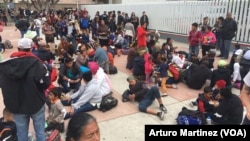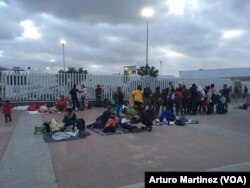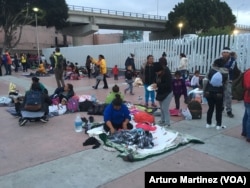After more than a month of travel by foot, bus and train, the Central American caravan of more than 150 people has stalled at Tijuana's U.S.-Mexico port of entry, where many are hoping to receive asylum — a U.S. safeguard against deportation for individuals believed to have a "credible fear" of persecution.
Upon the group's arrival, immigration officials said the port of entry, which has capacity to process roughly 300 people, was already full.
WATCH: At the U.S. Mexico border
Late Monday, the first of the migrants were allowed to enter the United States for processing, a group organizers said included eight people.
Nicole Ramos, an immigration lawyer with the nonprofit organization "Al Otro Lado," is among those faulting U.S. Customs and Border Protection (CBP) for delays.
"They knew the caravan was coming, so the lack of preparation is not the refugees' fault," Ramos said. "How is it that the American government, which is the most powerful country in the world and one of the richest, doesn't have the capacity to process 200 refugees — kids?"
Awaiting their turn, many migrants camped overnight with their belongings and loved ones. A mix of hope and anxiety was palpable outside the gate.
"I'm happy for the opportunity, and doubtful because of what could happen," one Honduran told VOA.
"A part of me is sad, but I'm happy to see so many friends here," said Adán Alberto Ramírez, an 18-year-old father from El Salvador.
The right of asylum
"We've been watching it. We've been watching it," President Donald Trump said in reference to the caravan on Monday. He called U.S. immigration laws "weak and obsolete."
In addition to calling for Congress to act, Trump criticized a policy known as "catch and release," which allows migrants to be released from prolonged detention while their asylum cases are pending.
"If they touch our property, if they touch our country, essentially you catch them and you release them into our country. That's not acceptable to anybody," Trump said. "We need a change in the law."
Asylum-seekers who enter through ports of entry are abiding by the current law. CBP emphasizes the importance of entering this way, and not elsewhere.
"If they come to the ports of entry, they identify themselves correctly and state their claim, and do it officially, absolutely," said CBP Public Affairs Specialist Meredith Mingledorff. "What we ask is that you don't go around the ports of entry and try to come into the country illegally between them."
"We understand that they have a dream, they have a need," added Jorge Rivera, a U.S. Border Patrol supervisor with California's El Centro Sector.
"There are laws in this country. We need to abide by them. We expect everybody that's coming to our country to abide by those laws, and we're here to enforce them."
The Justice Department announced Tuesday it has filed criminal charges against 11 migrants suspected to be members of the caravan for illegally entering the country.
"These 11 defendants face charges now because they believed themselves to be above the law," said United States Attorney for the Southern District of California Adam L. Braverman. "Those seeking entry into the United States must pledge fidelity to the law, not break them, or else face criminal prosecution.”
Deportation, a death sentence
Stymied in their attempt to apply for asylum, the migrants were facing another chilly night in the open air Monday. The temperature in Tijuana was forecast to drop to 11 degrees Celsius, and Tuesday was expected to be rainy.
Roughly half of the caravan are minors accompanied by their parents. And not all think they will be granted asylum. Upon learning their rights and chances of entry, some families have opted to stay in Mexico rather than face the risk of deportation, which they view as a death sentence.
Honduran native Luis Pavon is one. While he traveled with his girlfriend and baby daughter to the U.S.-Mexico border, he will stay on the Mexico side while his family presses on. He said he lost his father and brother to gang violence, but he feels his daughter and partner's chances of receiving asylum are greater than his own.
"Donald Trump wants to separate families, and in my case, I am going to be separated from my family," Pavon said. "In Honduras, [others] are already dead. I wouldn't be able to see my daughter again. But at least here, on this side of the border, I have the possibility of one day seeing her again."








